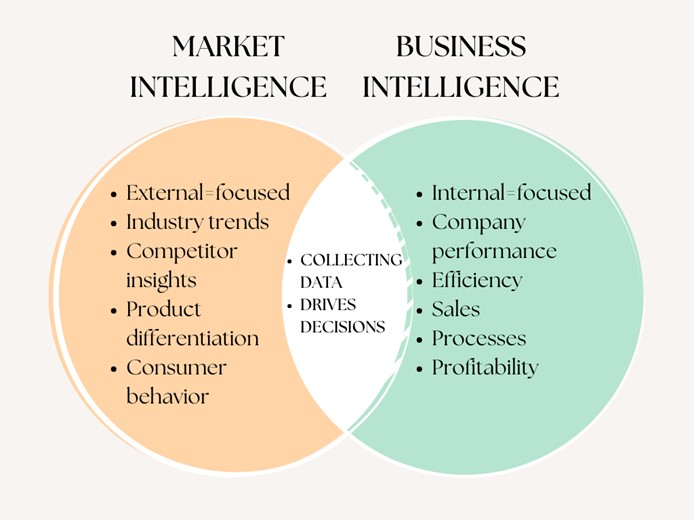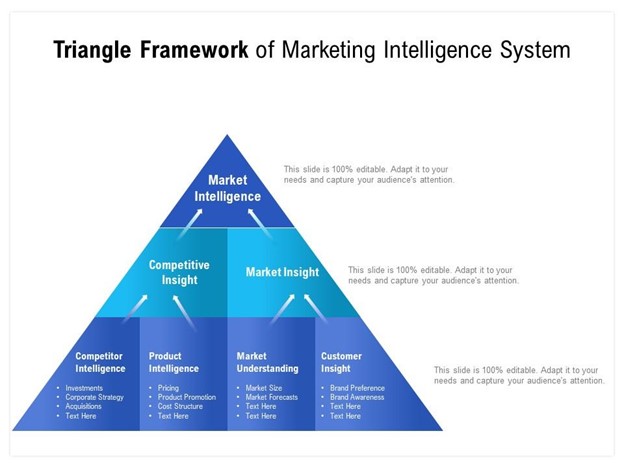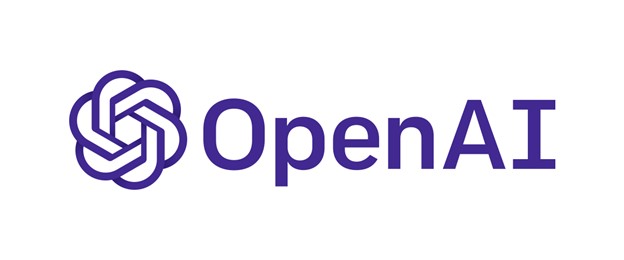16 min to read
As an entrepreneur, it's crucial to stay of the competition by staying well-informed and keeping up with the trends, in your industry. Understanding where the market is heading and the demand it holds each year can give any business an edge.. How can one accomplish this impossible task? This is where market intelligence comes into play!
Market intelligence not only provides insights into the changes happening within the market ecosystem but also helps companies determine which markets hold potential for their products or services. In this blog post we'll delve into what market intelligence entails how it operates and how access to data can give every business an advantage, over others. So without delay lets explore the fundamentals of marketing intelligence!

What Is Market Intelligence And What Does It Do For Businesses
Market intelligence plays a role, in helping businesses gain an advantage over their competitors in the industry. Simply put market intelligence involves gathering, analyzing and sharing information about market trends, consumer behavior and competitor activities. By utilizing market intelligence data businesses can make informed choices when it comes to product development, marketing strategies, pricing and managing the supply chain.
Moreover market intelligence enables companies to stay ahead of the game by identifying emerging trends before their rivals do. This allows them to seize opportunities and strengthen their position in the market. Ultimately the advantages of market intelligence are evident; it empowers companies to make decisions foster innovation effectively and achieve sustainable success, in todays highly competitive business environment.
How to Use Market Intelligence to Gain a Competitive Edge
To gain an advantage smart companies are adopting market intelligence strategies and tools that can provide them with the edge they require. Market intelligence involves gathering and analyzing data, on competitors, customers and broader market trends. By utilizing this information businesses can make informed choices regarding pricing, product development and marketing strategies. It enables them to discover opportunities identify risks and ultimately stimulate growth.
Whether you're a business owner or the CEO of a corporation understanding how to leverage market intelligence can offer you the competitive edge necessary for success. You can explore websites like www.talentneuron.com or other market intelligence platforms to access a range of data and insights that will assist you in making more informed business decisions. Furthermore with the advancement of data and artificial intelligence technologies in years market intelligence tools have become even more sophisticated and efficient, than ever before.
Whether you're a small business owner or a CEO of a large enterprise, understanding how to use market intelligence can give you the competitive advantage you need to succeed. You can visit www.talentneuron.com, or any other market intelligence platform, to access a wide range of data and insights that can help you make more informed business decisions. Plus, with the rise of big data and artificial intelligence, market intelligence tools are becoming more advanced and efficient than ever before.

Let's start by thinking about the difference between Market Intelligence and Business Intelligence and where do these converge in digital marketing.
Market Intelligence in Digital Marketing
- External Focused: Digital marketing relies heavily on understanding the environment. Platforms such as Google Analytics, SEMrush, and Ahrefs provide insights into web traffic, SEO rankings, and competitive analysis.
- Industry Trends: By using tools like Google Trends or BuzzSumo, we can stay updated with current topics, keywords, and content that are gaining traction in the industry.
- Competitor Insights: Competitive analysis tools like SimilarWeb and SEM Rush allow digital marketers to understand competitor website traffic, keyword strategies, and ad campaigns.
- Product Differentiation: In the digital world, A/B testing help in understanding which product features or marketing messages resonate better with online audiences.
- Consumer Behavior: Analytics tools provide data on user behavior on websites, interaction with content, and conversion paths. Moreover, social media listening tools like Brandwatch or Mention provide insights into consumer sentiments and discussions online.
Business Intelligence in Digital Marketing:
- Internal Focused: Dashboards like Tableau or Power BI enable marketers to visualize their internal data, such as website performance metrics, sales conversion rates, and customer engagement metrics, in a cohesive manner.
- Company Performance: Digital KPI dashboards allow companies to track their online performance metrics, such as organic traffic growth, click-through rates, and conversion rates.
- Efficiency: Automation tools like HubSpot or Marketo help streamline marketing processes, nurturing leads efficiently, and automating repetitive tasks, thereby improving the overall efficiency of digital marketing operations.
- Sales Processes: CRM platforms like Salesforce integrate with digital marketing tools to track leads generated from online campaigns, ensuring better alignment between sales and marketing teams.
- Profitability: Digital marketers can use ROI calculators and analytics to determine the profitability of specific campaigns, channels, or tactics, allowing them to allocate budgets more effectively.
Where Market Intelligence and Business Intelligence Converge in Digital Marketing?
- Data-Driven Decisions: The overlap between Market and Business Intelligence signifies data-driven decision-making. By understanding both external market conditions and internal business metrics, digital marketers can make informed decisions on campaign strategies, budget allocation, and target audiences.
- Personalization: With insights from both MI and BI, digital marketers can create highly personalized campaigns. For instance, understanding consumer behavior (MI) and correlating it with internal sales data (BI) can lead to highly targeted and personalized ad campaigns or email marketing strategies.
- Integrated Strategies: A synergy between MI and BI ensures that marketing strategies are not siloed. It means SEO, content marketing, paid advertising, and social media strategies are all aligned with both market trends and business goals.
- Continuous Optimization: Constant feedback from both external market insights and internal performance metrics ensures that digital marketing strategies are continually optimized. For instance, if market intelligence indicates a shift in consumer sentiment, businesses can quickly pivot their messaging or campaigns based on internal performance data.
Identifying Opportunities in the Marketplace
One of the advantages of market intelligence is its ability to assist businesses in discovering opportunities, within the marketplace. By examining consumer behavior demographic trends and competitor activities market intelligence can uncover gaps or emerging trends that businesses can leverage. This not ensures competitiveness. Also promotes innovation and expansion into new markets.
Moreover market intelligence aids businesses in identifying customer segments or areas where they can enhance their product offerings to better cater to consumer demand. With access to data and valuable insights companies can make decisions that ultimately lead to increased revenue and growth.
It's important to note that market intelligence isn't solely beneficial, for corporations; small businesses can also reap advantages by incorporating it into their operations. By comprehending the market landscape and consumer behavior small businesses can make decisions that enable them to remain foster growth.
The Benefits of Implementing Market Intelligence Solutions
In todays paced business world simply being proactive is not enough to outshine your competitors. To gain an advantage it's crucial to leverage market intelligence solutions that offer insights, into market trends, consumer behavior and competitor analysis. Armed with this information you can make strategic decisions enhance operational efficiency and ultimately boost your profits. By embracing the benefits of market intelligence solutions you'll be able to stay in your industry and position your business for long term success by gaining an edge.

In summary market intelligence plays a role, in todays competitive business landscape. It offers insights into market trends, consumer behavior and the activities of competitors. Businesses of all sizes can utilize this information to make decisions that drive product development, effective marketing strategies and increased profitability. Given the pace of market changes having access to and effectively utilizing market intelligence is essential for maintaining an advantage and achieving long term success. It's not, about keeping up with the competition but also staying one step ahead.
Triangle Framework of Marketing Intelligence System

Analyzing competitors' strategies can give valuable insights into what works and what doesn't in your industry. And competition is inevitable. Regardless of your industry or niche, there are likely several other companies vying for the same customer base. Understanding your competitors' strategies can provide invaluable insights that can help you make informed decisions, refine your offerings, and position your brand more effectively.
- Identifying Industry Best Practices: Observing successful strategies employed by competitors can highlight best practices within the industry. These tried-and-tested tactics can serve as a benchmark, allowing businesses to compare their operations and marketing strategies against industry standards.
- Recognizing Gaps: Thorough competitive analysis often reveals gaps in the market – areas underserved or completely overlooked by competitors Such revelations can present lucrative opportunities for businesses to introduce new products, services, or features that cater to these unmet needs.
- Enhancing Product Development: By understanding what competitors offer, businesses can refine their products or services. This might mean improving on existing features, introducing complementary ones, or even eliminating those that don't add value Feedback and reviews on competitors' products can also give a perspective on what customers like and dislike.
- Informed Marketing Strategies: Analyzing competitors' marketing efforts, from their social media campaigns to their advertising messaging, can provide insights into what resonates with the target audience. This understanding can guide a company's own marketing strategy, ensuring resources are channeled effectively and campaigns are tailored to the audience's preferences.
- Predicting Future Trends: Businesses that keep a close eye on their competitors can often predict industry trends. For instance, if multiple competitors start investing in a certain technology or service, it might indicate a shifting industry trend. Early identification of such trends gives businesses a competitive edge, allowing them to adapt and innovate ahead of the curve.
- Benchmarking Performance: By understanding competitors' performance metrics – be it sales figures, customer retention rates, or digital engagement stats – businesses can set realistic targets for themselves.
Benchmarking against competitors provides a clear picture of where a business stands in the market hierarchy and what areas require improvement.
- SEO: By researching competitors' backlink profiles, keyword rankings, and content strategies, you can identify potential opportunities and gaps in your own SEO strategy.
- PPC: By evaluating competitors' ad copy, landing pages, and keyword bids, you can gain insights into how to position your PPC campaigns for better results.
Product Intelligence: Understanding product-related data can be instrumental in positioning your offerings.
- SEO: Tailor content to highlight features or benefits of your product that are underserved or overlooked by competitors.
- PPC: Emphasize these unique selling points in ad copy to differentiate from competitors.
Market Insight:
Market Understanding: Knowledge of the market size and potential is critical for allocating resources.
The Importance of Understanding the Market - business environment having an understanding of the market is crucial for companies to succeed and outperform their competitors. This understanding revolves around knowing the size of the market and its potential, for growth. It's not about numbers; it reflects the existing demand, customer needs and opportunities for expansion. By assessing the market size businesses can determine how demand there is for their product or service. This information significantly influences planning and decision making processes.
Effective Resource Allocation based on Market Knowledge - When businesses understand the market size and potential they can allocate resources wisely. Without insights into the market allocating resources such as capital, workforce or technology would be like sailing without a compass. With a grasp of market dimensions companies can prioritize segments that offer returns on investment. They can focus their marketing efforts on targeting the audience and make choices regarding product development or service improvement. Furthermore this knowledge protects against overextending in saturated markets or missing out on opportunities, in growing ones—ensuring growth and profitability.
SEO: If there's a large potential audience searching for related terms, it justifies a stronger emphasis on organic search strategies.
PPC: Understand the potential reach and cost of targeting key segments in the market with ads.
Customer Insight:
Understanding how customers perceive and favor brands offers insights, into their purchasing behaviors, loyalties and decision making processes. In the era, where an online presence greatly influences brand reputation search engine optimization (SEO) becomes a tool for reinforcing and shaping these perceptions. A brands visibility on search engines on the page of search results can significantly impact how it is perceived. When a brand consistently appears for searches it not gains authority and trustworthiness but also becomes top of mind for consumers. This positioning plays a role in shaping the narrative around a brand allowing it to establish a digital presence that aligns with its desired image.
Brand value refers to the worth that a brand name brings to a product or service and SEO can be a factor in enhancing this value. By conducting keyword research businesses can gain insights into which terms their target audience associates with their brand and what they expect from it. Crafting content centered around these expectations and ensuring its visibility, on search engines can result in increased brand recognition and customer loyalty.
Furthermore implementing SEO strategies like acquiring backlinks and ensuring a smooth user experience can enhance a brands online credibility. When customers come across mentions of a brand on platforms and have seamless interactions, with its digital assets it strengthens their favorable perceptions. This in turn contributes to building long term brand value.
Brand Preference: Knowing how customers perceive and prefer brands can inform your approach to build brand equity through SEO (e.g., branded content, online reputation management) and PPC (e.g., bidding on branded terms).
Brand Awareness: If awareness is low, SEO efforts can focus on informational and top-of-funnel content. In PPC, campaigns can prioritize visibility and reach to boost awareness.
SEO: Customer behaviors, preferences, and pain points can guide content creation to answer their queries, thus improving organic visibility.
PPC: Understanding customer intent and behavior can refine ad targeting, making the campaigns more efficient and relevant.
Integration of the Three for SEO & PPC:
Holistic Strategy: Using insights from all three corners of the triangle ensures a well-rounded digital strategy. While SEO efforts drive organic traffic, understanding the competitive landscape and market nuances can make these efforts more targeted. Simultaneously, PPC campaigns become more effective when informed by customer insights and competitive data.
Keyword Strategy: Combine insights from all three areas to develop a robust keyword strategy. For instance, using competitive insights to find gaps in keyword targeting, market insights to prioritize high-volume or high-intent keywords, and customer insights to ensure relevancy and alignment with user intent.
Content & Ad Copy: Information from the triangle can guide the creation of resonant content (for SEO) and compelling ad copy (for PPC). Content and ads can address pain points, highlight unique selling points, and position the brand effectively against competitors.

Case Study: Boosting VELUX's Traffic with Marketing Intelligence & SEO
Background: VELUX, a leading manufacturer of roof windows and skylights, had maintained a significant online presence but saw potential for further growth. They partnered with Codedesign, seeking an innovative approach to leverage Marketing Intelligence tools and SEO techniques to enhance their digital visibility.
Objective: To increase VELUX's website traffic by leveraging the power of marketing intelligence and fine-tuning their SEO strategy to tap into unexplored opportunities.
Strategy & Implementation: Leveraging Marketing Intelligence Tools:
Competitor Analysis: Codedesign used advanced marketing intelligence tools to dissect the strategies of VELUX's competitors. This helped identify gaps in VELUX’s current approach and areas where they could gain a competitive edge.
Consumer Behavior Insights: Tools were employed to track user interactions, understand the consumer journey, and identify potential roadblocks or friction points on the VELUX website.
Keyword Analysis: By tapping into keyword intelligence, Codedesign unearthed high-volume, low-competition keywords relevant to VELUX’s offerings.
Optimizing SEO
On-page SEO: Tweaks were made to meta titles, descriptions, and on-page content, aligning them with the identified keywords and enhancing their relevance.
Technical SEO: Codedesign ensured that the VELUX website was fast, mobile-responsive, and free from crawl errors, making it easier for search engines to index and rank.
Content Strategy: Based on market intelligence insights, fresh content was created addressing user queries and showcasing VELUX's expertise in the domain.
Feedback Loop: The strategies employed weren’t static. Using the marketing intelligence tools, Codedesign continually monitored the results and adjusted the strategies as required, ensuring that VELUX stayed ahead of the curve.
Results:
- 25% Y/Y Increase in Traffic: Within a year, VELUX saw a substantial 25% increase in organic traffic to their website.
- Higher Search Engine Rankings: Many targeted keywords began ranking on the first page, some even clinching the top spot, leading to greater visibility.
- Improved User Engagement: With an enhanced user journey and high-quality content, VELUX experienced lower bounce rates and higher average session durations.
Conclusion:
By harnessing the power of marketing intelligence and integrating it with a robust SEO strategy, Codedesign propelled VELUX to new heights in the digital landscape. The collaboration not only drove traffic but also solidified VELUX's position as a market leader in its domain.

The future of Market Intelligence and how will AI contribute to it?
According to a report published by Evolve Business Intelligence, the Global Generative AI Market is projected to achieve a substantial valuation of USD 144.09 Billion by the year 2033 growing at an impressive compound annual growth rate (CAGR) of more than 38% from 2023 to 2033. This growth is driven by several key factors such as the increasing use of AI systems, and the surge in the use of generative AI in the healthcare industry. The top players in the global generative AI market include Google, Microsoft, IBM, Adobe, and Meta. (check source). So we know that AI is huge and will be pervasive in all systems. So, how will affect market intelligence?
The possibilities of AI, in market intelligence go beyond just data analysis and predictions. As AI technologies progress there are potential applications and impacts to consider;
Integration with Other Technologies; By combining AI with other technologies like the Internet of Things (IoT) Augmented Reality (AR) and Virtual Reality (VR) we can gain deeper insights into consumer behavior. For example IoT devices can collect real time data on how consumers use products, which can then be analyzed by AI to provide feedback on product design or marketing strategies.
In depth Consumer Understanding; Advanced AI models enable us to delve into understanding consumer psychology. By processing and analyzing data AI can not tell us what consumers are doing but also why they are doing it. This knowledge allows for effective marketing campaigns.
Real time Pricing Adjustments; With the help of AI businesses can dynamically adjust prices based on factors such as supply, demand, competitor prices and market conditions. This ensures optimal pricing strategies that maximize both profits and customer satisfaction.
Effective Risk Management; Through AIs ability to forecast market disruptions or changes in consumer sentiment businesses can adapt their strategies accordingly. This becomes particularly valuable in markets or industries that experience shifts.
The potential for AI in market intelligence extends beyond data analysis and predictions. With advancements in technology integrating AI with tools opens up possibilities for understanding consumers behaviors at a deeper level. Additionally dynamic pricing based on real time factors helps businesses optimize their profitability while satisfying customers needs. Furthermore anticipating market changes, through risk management powered by AI enables companies to stay agile in changing environments.
Improved Management of Supply Chains; AI has the capability to anticipate market demands, which can greatly assist businesses in managing their supply chains. This in turn can result in cost reduction and optimal resource allocation.
As AI becomes deeply integrated into market intelligence there will be an increasing need, for guidelines and transparent practices regarding how AI models make decisions and handle data. The issue of privacy will also become prominent necessitating the implementation of measures to protect data.
The adoption of AI in market intelligence brings both advantages and challenges. While it holds benefits businesses must also be cautious about potential drawbacks. Over reliance on AI without oversight can lead to oversights or misinterpretations. Therefore it is crucial to strike a balance by integrating AI driven insights with expertise to develop a market intelligence strategy. Like any advancement a thoughtful and well informed approach is essential, for effectively harnessing the potential of AI while upholding ethical standards.
FAQs - Frequently Asked Questions
What exactly is market intelligence, and how does it differ from market research?
Market intelligence is a comprehensive understanding of a market's size, trends, customer needs, and competitive landscape, often derived from a blend of internal and external data sources. It differs from market research in its scope and application. Market research typically focuses on specific questions or issues, gathering data through surveys, focus groups, and other direct methods to inform product development, customer preferences, and marketing strategies. Market intelligence, on the other hand, encompasses a broader spectrum, including industry analysis, competitor performance, and broader market trends, leveraging data analytics, market research, and competitive intelligence. It aims not only to understand the current market landscape but also to predict future trends and behaviors.
Why is market intelligence crucial for businesses in today's competitive landscape?
In today's highly competitive and fast-paced market environment, market intelligence is crucial for businesses to remain relevant and agile. It equips companies with the insight needed to make informed decisions, anticipate market changes, and understand customer needs and behaviors more deeply. This deep understanding enables businesses to tailor their strategies, optimize their offerings, and ultimately outmaneuver their competition. For instance, companies like Codedesign have leveraged market intelligence to identify emerging trends and adapt their digital marketing strategies accordingly, resulting in more effective and targeted campaigns that drive growth and customer engagement.
How can companies effectively collect and analyze market intelligence data?
Companies can effectively collect and analyze market intelligence data by employing a mix of primary and secondary research methods, including the use of advanced data analytics, social media listening tools, and customer feedback mechanisms. Utilizing digital platforms and technologies, such as Data Management Platforms (DMPs) and Customer Relationship Management (CRM) systems, allows for the aggregation and analysis of vast amounts of data from diverse sources. This approach not only helps in capturing a comprehensive view of the market but also in uncovering hidden patterns and insights through sophisticated data analysis techniques. For example, by analyzing website traffic data and online customer behavior, businesses can identify potential market opportunities and customer pain points.
What are some key tools and technologies for gathering market intelligence?
Key tools and technologies for gathering market intelligence include Data Management Platforms (DMPs), Customer Relationship Management (CRM) systems, social media analytics tools, and competitive intelligence software. DMPs are crucial for collecting, organizing, and activating large datasets from various sources, while CRM systems provide valuable insights into customer interactions and preferences. Social media analytics tools enable businesses to monitor brand mentions, customer sentiment, and trending topics, offering real-time market and competitive insights. Competitive intelligence software, on the other hand, helps companies track competitors' online activities, marketing strategies, and performance metrics, giving them a strategic advantage in the market.
How does market intelligence impact decision-making processes within a company?
Market intelligence significantly impacts decision-making processes within a company by providing data-driven insights that inform strategic planning, marketing strategies, product development, and customer engagement tactics. It enables leaders to make informed decisions based on a comprehensive understanding of the market dynamics, competitive landscape, and customer behaviors. This strategic approach reduces the risks associated with business decisions, promotes proactive rather than reactive strategies, and ensures that resources are allocated efficiently to initiatives that are most likely to drive growth and profitability.
In what ways can market intelligence be used to gain a competitive edge?
Market intelligence can be used to gain a competitive edge by identifying unmet customer needs, emerging market trends, and gaps in competitors' strategies. By leveraging these insights, companies can develop innovative products, tailor marketing messages, optimize distribution channels, and implement targeted promotions that resonate with customers. Additionally, understanding the competitive landscape enables businesses to differentiate their offerings, improve customer experience, and refine their value propositions, further strengthening their market position and brand loyalty.
Can small businesses also benefit from market intelligence, and if so, how?
Absolutely, small businesses can also benefit significantly from market intelligence. Even with limited resources, they can leverage free or low-cost tools for social media listening, customer feedback, and competitive analysis to gain insights into market trends, customer preferences, and competitive actions. By focusing on niche markets or specific customer segments, small businesses can use market intelligence to identify unique opportunities for differentiation and growth. This strategic approach enables them to compete more effectively against larger players by being more agile, customer-focused, and innovative in their offerings and marketing strategies.
How does market intelligence contribute to the development of marketing strategies?
Market intelligence contributes to the development of marketing strategies by providing a solid foundation of knowledge about the market, customers, and competitors. This insight informs the selection of target markets, the positioning of products or services, and the development of unique selling propositions that resonate with customers. It also guides the choice of marketing channels, tactics, and messages that are most likely to engage the target audience effectively. For example, by understanding customer preferences and behaviors, a company can tailor its content marketing strategy to address specific needs and interests, leading to higher engagement and conversion rates.
What role does AI play in the future of market intelligence?
AI plays a transformative role in the future of market intelligence by enabling more sophisticated data analysis, predictive modeling, and real-time insights. AI technologies, such as machine learning algorithms and natural language processing, can process vast amounts of data from diverse sources, identifying patterns, trends, and correlations that might be invisible to human analysts. This capability allows businesses to anticipate market shifts, customer needs, and emerging opportunities with greater accuracy. Moreover, AI can automate routine data collection and analysis tasks, freeing up analysts to focus on strategic interpretation and decision-making. This integration of AI into market intelligence will significantly enhance the speed, accuracy, and effectiveness of business strategies in the competitive landscape.
How can companies ensure they are ethically using market intelligence?
Companies can ensure they are ethically using market intelligence by adhering to data privacy laws, obtaining data through legitimate sources, and respecting consumer privacy and consent. This includes transparent data collection practices, secure data storage and management, and the responsible use of analytics and insights. Moreover, ethical market intelligence involves using data to serve customer needs and preferences without manipulation or exploitation. By fostering trust and transparency in their use of data, companies can maintain their reputation, build customer loyalty, and navigate the complexities of the digital age with integrity.

Add comment ×